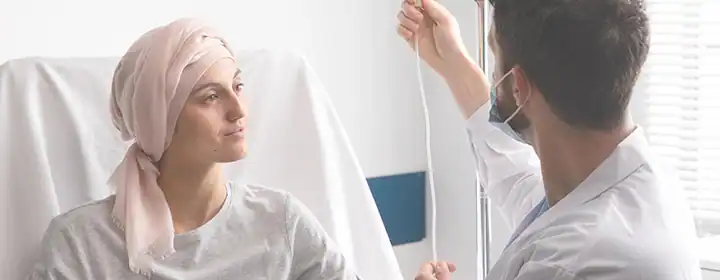What makes Sunrise Oncology Centre’s cancer treatment hospital in Mumbai stand out from a cancer specialist hospital in Mumbai - At our cancer treatment centers in Mumbai, we distinguish ourselves through a comprehensive approach that integrates cutting-edge medical technology with compassionate care. Our team of experienced oncologists collaborates closely to tailor treatment plans to each patient's unique needs, ensuring personalized care every step of the way
Our commitment extends beyond mere medical intervention; we also specialize in palliative care, ensuring that our patients experience comfort and support throughout their journey. At our cancer specialist hospitals in Mumbai, we understand the unique challenges posed by cancer, and we are dedicated to guiding our patients towards the best possible outcomes. Trust us to be your partner in the fight against cancer, and experience the unparalleled care of a premier cancer specialist hospital in Mumbai.

Chemotherapy is the most used form of therapy in almost all types of cancers. Sunrise Oncology Centre believes in using techniques to reduce the side effects of chemotherapy to the greatest extent while improving the patient's quality of life. Our highly experienced panel of doctors and support staff aim to provide the latest and best treatment to ensure that the patient receives the best care possible.

To put in simpler words Immunotherapy is using our own immunity to help fight cancer (immunotherapy is basically like super charging the body’s immune system), immunotherapy is the latest breakthrough in cancer treatment. Sunrise Oncology Centre has an expert team of doctors who have successfully used immunotherapy to treat patients. We utilize tailored lab-made substances to improve the immune system’s efficiency in finding and attacking cancer cells by effectively neutralizing them.

In the later stages of cancer where other treatment modalities were unsuccessful, We strive to provide a decent pain-free quality of life with palliative chemotherapy. We also offer pain management techniques to deal with the physical pain associated with cancer. Mental well-being is of paramount importance in cancer treatment, and Sunrise Oncology Centre offers psychological counseling to both patients and their family members to cope with the disease and the treatment procedure.
With a team of highly experienced doctors and support staff and utilizing state-of-the-art technology, Sunrise Oncology Centre aims to provide the best cancer treatment in Mumbai and be approachable to the masses while maintaining the highest standards of quality. Request an appointment to meet our doctors and find out how we can help you.

Targeted therapy uses drugs to precisely attack certain types of cancer cells. Targeted therapy is sometimes used in a standalone setting or is used in combination with chemotherapy or surgery. Attacking cancer cells more effectively with drugs, targeted therapy has been found to be highly effective. The Sunrise Oncology Centre has successfully treated numerous patients with targeted therapy, ensuring that only the cancer cells are being attacked while zeroing the damage to normal healthy cells.

Metronomic therapy is an alternate approach to chemotherapy where low dose drugs are administered over a prolonged period to reduce side effects, treatment efficacy and cost (in other words, it is the repeated administration of drugs at low doses frequently without long drug-free periods). Our experienced medical team is well-versed in providing metronomic therapy, and we have treated numerous patients successfully.

A bone marrow transplant (BMT) is a specialized therapy for specific types of cancer. BMT includes extraction and filtration of bone marrow stem cells, these cells are then reintroduced into either the donor or another recipient. BMT is done to replace unhealthy bone marrow with healthy cells after treating and eliminating abnormal ones. For certain blood-related cancers and disorders, BMT is a life-saving option. BMT has proven its efficacy by curing conditions like leukemia, lymphomas, and some solid tumor cancers.